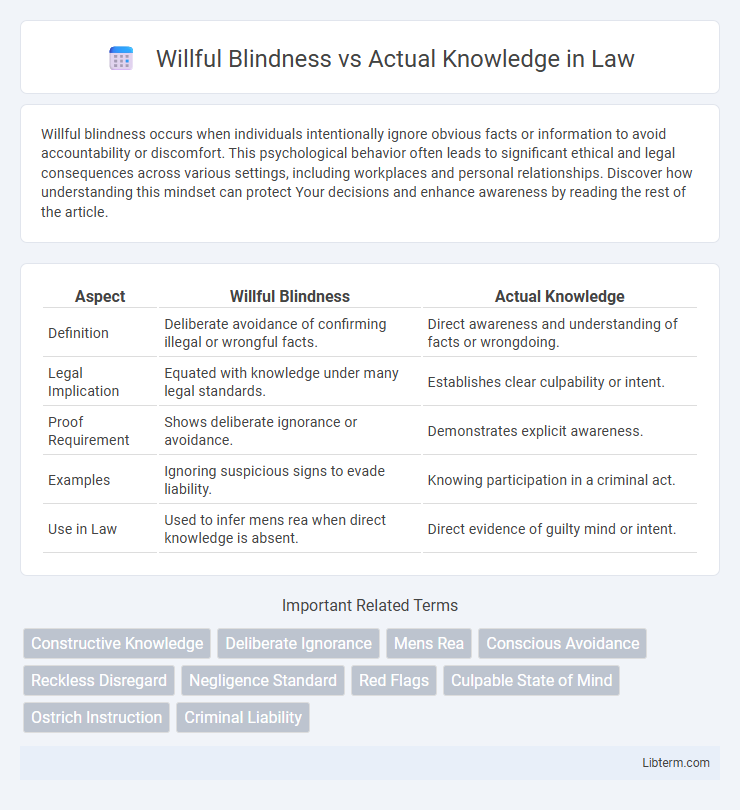Willful blindness occurs when individuals intentionally ignore obvious facts or information to avoid accountability or discomfort. This psychological behavior often leads to significant ethical and legal consequences across various settings, including workplaces and personal relationships. Discover how understanding this mindset can protect Your decisions and enhance awareness by reading the rest of the article.
Table of Comparison
| Aspect | Willful Blindness | Actual Knowledge |
|---|---|---|
| Definition | Deliberate avoidance of confirming illegal or wrongful facts. | Direct awareness and understanding of facts or wrongdoing. |
| Legal Implication | Equated with knowledge under many legal standards. | Establishes clear culpability or intent. |
| Proof Requirement | Shows deliberate ignorance or avoidance. | Demonstrates explicit awareness. |
| Examples | Ignoring suspicious signs to evade liability. | Knowing participation in a criminal act. |
| Use in Law | Used to infer mens rea when direct knowledge is absent. | Direct evidence of guilty mind or intent. |
Introduction to Willful Blindness and Actual Knowledge
Willful blindness refers to a deliberate effort to avoid obtaining knowledge of illegal or unethical actions despite obvious signs, while actual knowledge means possessing direct awareness of such facts. In legal and compliance contexts, willful blindness can be treated similarly to actual knowledge because it demonstrates intentional ignorance to evade responsibility. Distinguishing between these concepts is crucial for determining culpability and enforcing accountability in regulatory frameworks.
Defining Willful Blindness
Willful blindness occurs when an individual deliberately avoids acquiring knowledge of wrongdoing to escape liability or responsibility. Unlike actual knowledge, which involves direct awareness of facts or circumstances, willful blindness requires conscious effort to remain ignorant. This legal doctrine prevents individuals from evading accountability by intentionally ignoring clear indications of illegal or unethical conduct.
Understanding Actual Knowledge
Actual knowledge refers to the awareness of specific facts or information, where an individual possesses concrete evidence or direct understanding of a situation. It contrasts with willful blindness, which involves deliberately avoiding acquiring knowledge to escape liability. Understanding actual knowledge is crucial in legal contexts as it establishes the basis of intentionality and accountability in actions or decisions.
Legal Implications of Willful Blindness
Willful blindness occurs when an individual intentionally avoids acquiring knowledge of illegal activities to evade liability, which courts treat similarly to actual knowledge in many jurisdictions. Legal implications of willful blindness include the imposition of criminal liability and civil penalties, as courts often hold defendants accountable for deliberately ignoring clear evidence of wrongdoing. This doctrine prevents defendants from escaping responsibility by consciously avoiding awareness of illegal conduct, reinforcing strict liability standards in issues such as fraud, drug trafficking, and corporate misconduct.
Legal Consequences of Actual Knowledge
Actual knowledge in legal contexts imposes direct liability, as individuals or entities cannot claim ignorance of wrongdoing. Courts often treat actual knowledge as a clear indicator of intent or recklessness, resulting in harsher penalties and stricter enforcement actions. Contrastively, willful blindness may mitigate culpability but does not absolve responsibility when actual knowledge is proven.
Key Differences Between Willful Blindness and Actual Knowledge
Willful blindness occurs when an individual deliberately avoids acquiring knowledge of facts to evade liability, while actual knowledge means being fully aware of the facts or circumstances. The key difference lies in intent; willful blindness involves conscious avoidance, whereas actual knowledge reflects direct awareness. Legal implications vary, as willful blindness can substitute for actual knowledge in proving culpability.
Willful Blindness in Criminal Law
Willful blindness in criminal law occurs when a person intentionally avoids acquiring knowledge of illegal activities to evade liability. Courts treat willful blindness as equivalent to actual knowledge, attributing culpability when defendants deliberately ignore facts to escape responsibility. This doctrine prevents individuals from benefiting from their conscious avoidance of the truth in criminal prosecutions.
Actual Knowledge in Civil and Criminal Contexts
Actual knowledge in civil and criminal contexts signifies direct awareness of a fact or circumstance, impacting liability and culpability significantly. In civil cases, actual knowledge often influences breach of duty or negligence claims, establishing that a party was consciously aware of risks or violations. In criminal law, actual knowledge is critical in proving mens rea, where the defendant must have been aware of the illegality of their actions or specific facts, distinguishing deliberate wrongdoing from ignorance or mistake.
Case Studies Illustrating Both Concepts
Case studies in corporate law frequently differentiate willful blindness from actual knowledge by examining executives' awareness and deliberate ignorance of illegal activities within their organizations. In United States v. Jewell, the court established that deliberately avoiding knowledge to evade liability constituted willful blindness, contrasting with cases like United States v. Carroll, where actual knowledge of criminal intent was proven through direct evidence. These cases highlight legal distinctions where willful blindness involves conscious avoidance, while actual knowledge requires direct awareness of wrongful conduct.
Conclusion: Navigating Liability and Responsibility
Willful blindness and actual knowledge differ fundamentally in legal responsibility, where willful blindness involves deliberate ignorance to avoid liability, while actual knowledge requires proven awareness of wrongdoing. Courts often hold parties equally liable under willful blindness when evidence shows conscious avoidance of facts. Navigating these distinctions is crucial for establishing accountability in cases of negligence or fraud.
Willful Blindness Infographic

 libterm.com
libterm.com